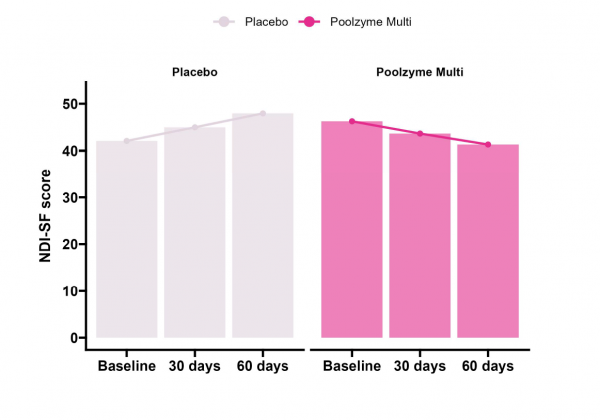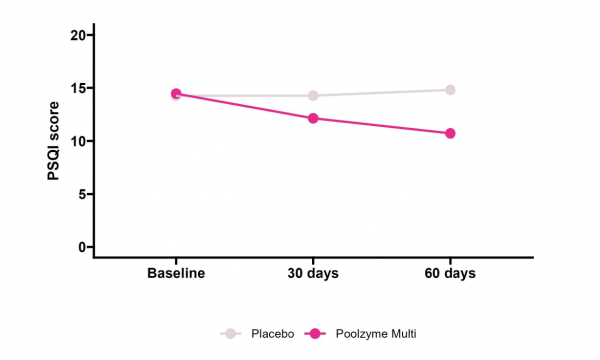Promotional Features
Relieve occasional digestive discomfort after heavy meals and improve sleep quality
According to the World Health Organization (WHO), unhealthy diet and lack of physical activity are leading global risks to health.1
A healthy diet throughout the life-course, in turn, contributes to longer-term health benefits such as reducing the risk of becoming overweight or obese and developing noncommunicable diseases (NCDs) later in life. On the contrary, increased availability of ultra-processed foods and changing lifestyles have led to a shift in dietary patterns, with increased consumption of calorie-dense foods high both in fats and sugars, and subsequent increase in gastrointestinal (GI) disorders.
Nowadays, symptoms of upper gastrointestinal discomfort, including indigestion, are very common among the general population. Indigestion, also known as dyspepsia or upset stomach, is one or more symptoms including a feeling of fullness during a meal, uncomfortable fullness after a meal, and burning or pain in the upper abdomen.2
The term ‘functional dyspepsia’ (FD) refers to one or more symptoms of dyspepsia with no evidence of disease, thus a cause cannot be found. It represents the most prevalent form reaching up to 80% of cases of dyspepsia and it is considered one of the most common functional GI disorders affecting over 16% of the otherwise healthy individuals worldwide.3 Due to sociodemographic factors, including dietary practices and consumption of junk foods, the highest prevalence of FD has been found in Western countries.4,5
Digestive enzymes are known as the powerhouse of digestion. They are naturally produced by our body and are pivotal for an efficient digestion. However, in some circumstances such as during emotional and physical stress, in case of poor food choices and over-eating, digestive enzymes produced by our body are often not enough. Moreover, their production declines progressively with aging. As a result, food breakdown is reduced and dyspeptic symptoms are likely to occur, thus negatively affecting quality of life and everyday activities.
On top of that, subjects with these discomforts may also suffer of visceral hypersensitivity, altered gut microbiota or central dysregulation (gut-brain axis), all conditions correlated to sleep and circadian rhythm disturbances.6 People with FD symptoms commonly report poor sleep quality. A 2022 survey with 355 subjects with diagnosis of FD according to the Rome IV criteria revealed altered sleep quality in more than 81% of assessed people.7
It is well recognized that digestive complaints may interfere with sleep induction or continuation. On the other hand, lack of sleep is known to influence digestion and nutrients metabolism by disrupting hormones that regulate appetite as well as increasing the desire for high-calorie foods. This can trigger a vicious cycle which is frustrating for the affected subjects.
A comprehensive and multifactorial approach should be considered to manage FD and relieve digestive discomforts. Some people may experience benefits by making some lifestyle changes and decreasing stress. It is recommended to eat several small, low-fat meals throughout the day, as well as reducing coffee, carbonated beverages, and alcohol. In addition, the overuse of drugs may irritate the stomach lining, such as non-steroidal anti-inflammatory drugs (NSAIDs) which contributes to exacerbate this condition and related symptoms.
There are many treatment options to manage functional dyspepsia, but there is no single solution that works for everyone. Of course, having efficient levels of digestive enzymes is therefore essential both to sustain food breakdown and avoid consequences of indigestion on other areas of health, primarily sleep. Therefore, supporting digestion with a broad-spectrum digestive enzyme blend may represent a useful aid for reinforcing the body’s natural enzyme production.
Poolzyme® Multi is the clinically tested solution provided by Giellepi to relieve occasional digestive discomforts and ease an overfull feeling after heavy meals. It includes five vegetarian enzymes precisely formulated to break down fats, starches, proteins, fibers and lactose thus helping to comfortably eat a wide range of foods.
Poolzyme® Multi is effective to relieve fullness, bloating, and other occasional issues associated with poor digestion, specifically after a large meal as well as to support sleep quality.
The benefits of Poolzyme® Multi have been demonstrated in a randomized, double blind, placebo controlled clinical trial, completed recently by researchers from University Federico II of Naples.8 A total of 120 generally healthy adults with FD, according to Rome IV diagnostic criteria, and no other gastrointestinal disorders were enrolled and randomized (allocation ratio 1:1) to receive 2-capsules per day, with lunch and dinner, of either Poolzyme® Multi or placebo for 2-months.
The primary endpoint was to evaluate the effectiveness on relieving FD typical discomforts as assessed by a validated Nepean Dyspepsia Index-SF (NDI-SF) questionnaire. It is a self-assessment questionnaire for evaluating the frequency, intensity and type of disturbs as well as the emotional, working and social sphere of the subjects. The secondary endpoint was to assess the effects on sleep quality by using the Pittsburgh Sleep Quality Index (PSQI), a self-rated validated questionnaire.
During the study, three different visits were carried out at baseline, after one month and two months of supplementation during which both SF-NDI and PSQI scores were captured.
Supplementation with Poolzyme® Multi resulted more effective than placebo in improving frequency, severity and discomforts of FD symptoms compared to placebo, already after 30 days (figure 1).
Figure 1. FD discomforts assessed by NDI-SF score
A similar trend was found for sleep quality. In fact, subjects supplemented with Poolzyme® Multi experienced a progressive and significant (p<0.01) improvement of sleep quality already from the first month of supplementation compared to the subjects taking the placebo who, on the contrary, reported a worsening in sleeping (figure 2). In particular, a 27.7% reduction of PSQI score was reordered at the end of the supplementation with Poolzyme® Multi compared to both baseline and placebo.
No side effects were reported during the entire study.
Figure 2. Sleep disturbances assessed by PSQI score
As highlighted by a recent report, the clinical proof is among the highest form of validation for a dietary supplement generally recognized by consumers and considered as the top factor when choosing a dietary supplement.9 With Giellepi’s rigorous randomized clinical study, it wanted to prove Poolzyme® Multi safety and effectiveness in promoting digestive comfort and sleep quality thus building confidence and trust in the end-user while using claims that are scientifically substantiated.
References
1. World Health Organization. 2020. Healthy diet.
2. American College of Gastroenterology. Dyspepsia.
3. Ford, A. C.; Mahadeva, S.; Carbone, M. F.; et al. (2020). Functional dyspepsia. Lancet. 396(10263), 1689–1702.
4. Hreinsson, J. P.; Wong, R. K. M.; Tack, J.; et al. (2023). A comparative study of disorders of gut–brain interaction in Western Europe and Asia based on the Rome foundation global epidemiology study. Neurogastroenterology & Mobility. 35(6).
5. Nakamura, F.; Kuribayashi, S.; Tanaka, F.; et al. (2021). Impact of improvement of sleep disturbance on symptoms and quality of life in patients with functional dyspepsia. BMC gastroenterology. 21(1), 78.
6. Aziz, I.; Palsson, O. S.; Törnblom, H.; et al. (2018). Epidemiology, clinical characteristics, and associations for symptom-based Rome IV functional dyspepsia in adults in the USA, Canada, and the UK: a cross-sectional population-based study. The lancet. Gastroenterology & hepatology, 3(4), 252–262.
7. Wuestenberghs, F.; Melchior, C.; Desprez, C.; et al. (2022). Sleep quality and insomnia are associated with quality of life in functional dyspepsia. Front Neurosci. 16:829916.
8. Dr Alessandra Baldi. (2023). The beneficial effect of ingestion of a food supplement based on a pool of digestive enzymes in people with functional dyspepsia.
9. Natural Products Insider. (2023). Clinically proven: Research reveals the power phrase reshaping consumer purchasing – spotlight.



